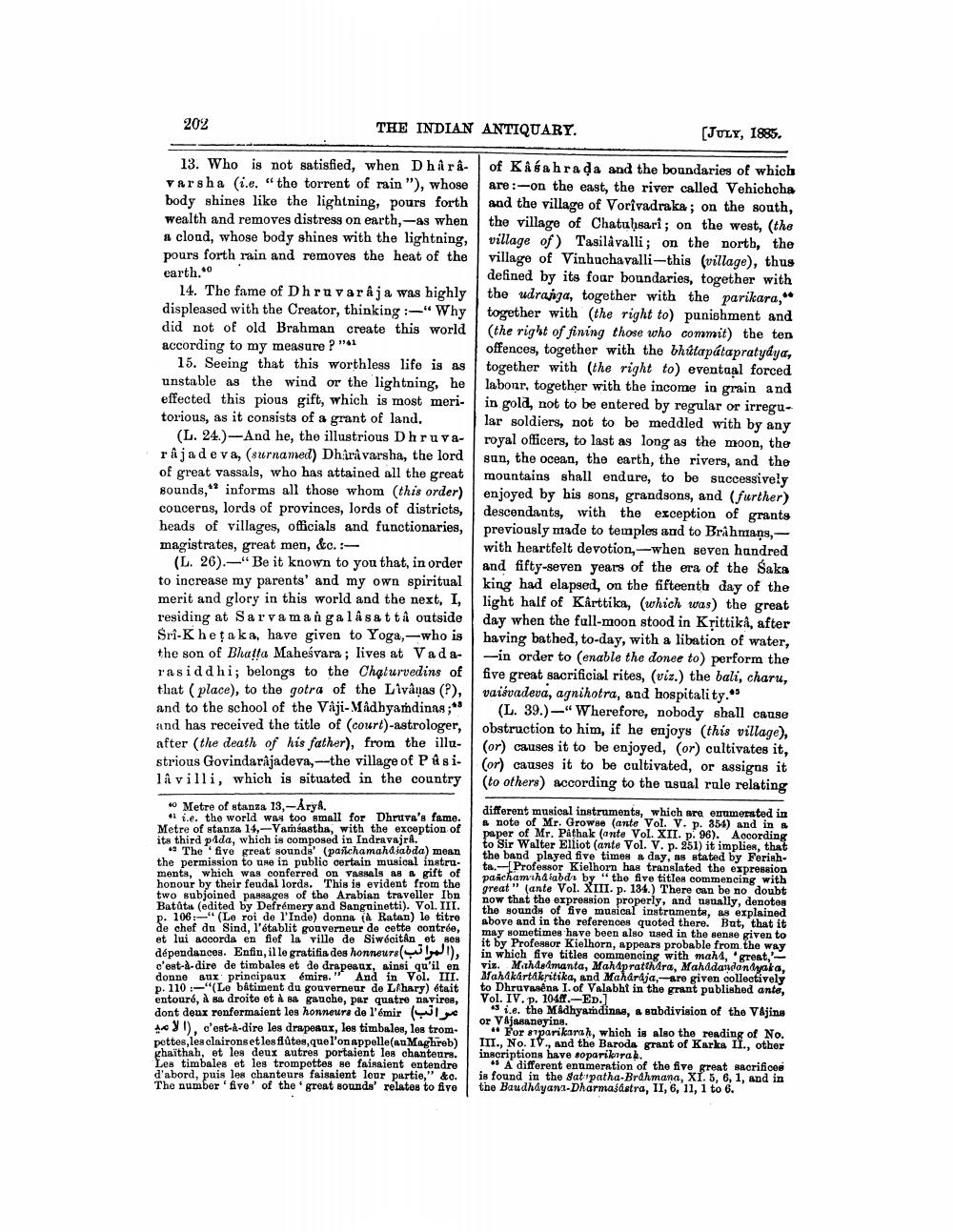________________
202
THE INDIAN ANTIQUARY.
(JULY, 1885.
earth..
13. Who is not satisfied, when Dhira. of Kåsahrada and the boundaries of which varsha (i.e. "the torrent of rain"), whose are :--on the east, the river called Vehichcha body shines like the lightning, pours forth and the village of Vorivadraka; on the south, wealth and removes distress on earth, -as when the village of Chatuhsari; on the west, (the #cloud, whose body shines with the lightning, village of) Tasilâvalli; on the north, the pours forth rain and removes the heat of the village of Vinhuchavalli-this (village), thus
defined by its four boundaries, together with 14. The fame of Dhruvarâja was highly the dranga, together with the parikara," displeased with the Creator, thinking :-"Why together with the right to) punishment and did not of old Brahman create this world (the right of fining those who commit) the ten according to my measure ?"
offences, together with the bhutapatapratydya, 15. Seeing that this worthless life is as together with the right to) eventaal forced unstable as the wind or the lightning, he labour, together with the income in grain and effected this pious gift, which is most meri- in gold, not to be entered by regular or irregutorious, as it consists of a grant of land, lar soldiers, not to be meddled with by any
(L. 24.)-And he, the illustrious Dhruva- royal officers, to last as long as the moon, the râjade va, (surnamed) Dhiravarsha, the lord sun, the ocean, the earth, the rivers, and the of great vassals, who has attained all the great mountains shall endure, to be successively Bounds," informs all those whom (this order) enjoyed by his sons, grandsons, and further) couceros, lords of provinces, lords of districts, descendants, with the exception of grants heads of villages, officials and functionaries, previously made to temples and to Brahmangmagistrates, great men, &c.:
with heartfelt devotion-when seven handred (L. 26).-"Be it known to you that, in order and fifty-seven years of the era of the Saka to increase my parents' and my own spiritual king had elapsed, on the fifteenth day of the merit and glory in this world and the next, L, light half of Kärttika, (which was) the great residing at Sarva manga låsatti outside day when the full-moon stood in Krittiká, after Sri-Kheta ka, have given to Yoga, -who is having bathed, to-day, with a libation of water, the son of Bhatta Maheśvara; lives at Vada -in order to enable the donee to perform the rasiddhi; belongs to the Chaturvedins of five great sacrificial rites, (viz.) the bali, charu, that place), to the gotra of the Livanas (?), vaišvadeva, agnihotra, and hospitality." and to the school of the Vaji-Madhyamdinag ;* (L. 39.)—“Wherefore, nobody shall cause and has received the title of (court) astrologer, obstruction to him, if he enjoys (this village), after the death of his father), from the illu- (or) causes it to be enjoyed, (or) cultivates it, strious Govindarajadeva,--the village of Pasi. (or) causes it to be cultivated, or assigas it la villi, which is situated in the country (to others) according to the usual rule relating
40 Metre of stanza 13,- Arya.
i.e. the world was too small for Dhruva's fame. Metre of stansa 14.-Yaminatha, with the exception of ita third pida, which is composed in Indravajra.
41 The five great sounds' (paschamahdiabda) mean the permission to use in public certain musical instru. ments, which was conferred on vassals as a gift of honour by their feudal lords. This is evident from the two subjoined passages of the Arabian traveller Ibn Batata (edited by Defrémery and Sanguinetti). Vol. III. p. 106:- (Le roi de l'Inde) donna A Ratan) le titre de chef du Sind, l'établit gouverneur de cette contrée, et lui accorda en fief la ville de Siwócitin et ses dépendances. Enfin, il le gratitia des honneurs w y ), c'est-d-dire de timbales et de drapeaux, ainsi qu'il en donne Box principaux émire." And in Vol. III. p. 110 -"(Le bâtiment du gouverneur de Lihary) était entouré, a sa droite et à la gauche, par quatre naviros, dont deux ronfermaient les honneurs de l'émir wie 40 YI), c'est-A-dire les drapeaux, les timbales, les trompettes, les clairons et les flûtes, que l'on appelle(au Maghreb) ghaithah, et les deux autres portaient les chanteurs. Le timbales et les trompettes se faisaient entendre d'abord, puis les chanteurs faisaient lour partie, &o. The number'fivo' of the great sounds' relates to five
different musical instruments, which are enumerated in A note of Mr. Growse (ante Vol. V. p. 854) and in a paper of Mr. Pathak (ante Vol. XII. p. 96). According to Sir Walter Elliot (ante Vol. V. p. 251) it implies, that the band played five times a day, as stated by Ferishta. Professor Kielhorn has translated the expression panchamıha labd by the five titles commencing with great" (ante Vol. XIII. p. 134.) There can be no doubt now that the expression properly, and usually, denotes the sounds of five musical instrumente, as explained above and in the references quoted there. But, that it may sometimes have been also used in the sense given to it by Professor Kielhorn, appears probable from the way in which five titles commencing with mah4, great, viz. Mahdeimanta, Mahapratthara, Mahddandandyaka, BanakartAkritika, and Maharija, are given collectively to Dhruvasena I. of Valabht in the grant published ante, Vol. IV. p. 10481.-ED.]
451.e. the Madhyamdinas, a subdivision of the Vajina or Vjasaneyine.
** For sparikarah, which is also the reading of No. III., No. 19., and the Baroda grant of Karks II., other inscriptions have soparikarah.
45 A different enumeration of the five great sacrificee is found in the Satpatha Brahmana, XI. 8, 6, 1, and in the Baudhdyan-Dharmasastra, II, 6, 11, 1 to 6.




